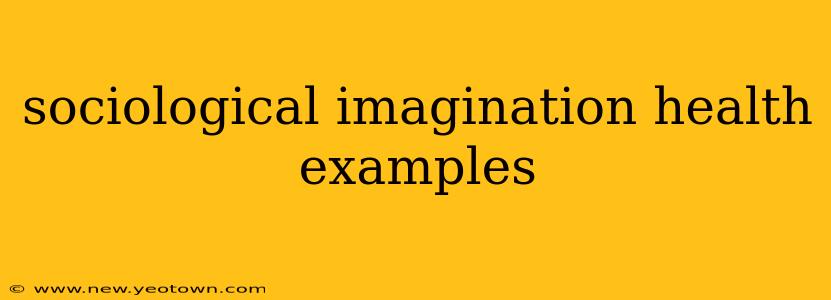Unlocking the Mysteries of Sickness: Sociological Imagination and Health
Have you ever felt overwhelmed by a personal health crisis, wondering why you, specifically, are facing this challenge? Or perhaps you've noticed a disturbing trend in a community, questioning the underlying societal forces at play? This is where the sociological imagination comes in – a powerful lens that helps us understand personal troubles as public issues. Let's explore how this concept connects to our health and well-being, weaving together personal narratives with broader societal structures.
Imagine Sarah, a young single mother working two minimum wage jobs. She struggles to afford healthy food and reliable transportation, let alone healthcare. She develops Type 2 diabetes. Is this simply Sarah's individual failing? Or is it a reflection of a larger societal problem – one of systemic inequalities that disproportionately affect low-income individuals and limit their access to resources crucial for good health?
That's the essence of sociological imagination. It bridges the gap between individual experiences and the broader social context. It pushes us beyond blaming individuals for their health outcomes and encourages us to examine the systemic factors that shape health disparities.
What are some examples of the sociological imagination applied to health?
This isn't just a theoretical exercise; the sociological imagination has real-world applications and helps us understand numerous health challenges. Let's delve into some key areas:
How does socioeconomic status affect health outcomes?
This is perhaps the most obvious application. People with higher socioeconomic status generally enjoy better health, living longer and experiencing fewer health problems. This isn't merely a matter of access to healthcare; it’s also about access to nutritious food, safe housing, and less stressful environments. These factors can significantly impact a person's overall health and well-being, reinforcing existing health inequalities. Sarah's story perfectly illustrates this point, highlighting how poverty and lack of resources create a vicious cycle of poor health.
What is the role of social networks in health?
Our social connections – family, friends, and community groups – significantly impact our health. Strong social support networks can buffer stress, provide emotional support during illness, and even influence health behaviors. Conversely, social isolation and loneliness have been linked to poorer physical and mental health. This demonstrates how our social environment interacts with our physical and mental well-being.
How does culture and social norms affect health choices?
Cultural norms and beliefs profoundly shape our health behaviors. For example, societal attitudes towards smoking, diet, and exercise influence individual choices. Cultural values also affect how we seek and use healthcare services. Understanding these cultural nuances is crucial for effective health interventions, and tailors messaging to resonate with specific populations.
What is the impact of healthcare systems on health equity?
The structure and accessibility of healthcare systems themselves can exacerbate health inequalities. Disparities in access to quality healthcare, insurance coverage, and healthcare providers can disproportionately affect marginalized communities. A sociological imagination prompts us to critically evaluate healthcare systems to identify and address structural issues that contribute to health disparities.
How does stress and social inequality contribute to health problems?
Chronic stress associated with poverty, discrimination, and social inequality takes a toll on our bodies and minds. These stressors increase the risk of numerous health problems, including heart disease, mental illness, and weakened immunity. Addressing the root causes of stress and inequality is crucial to improving population health.
In Conclusion:
The sociological imagination isn't about dismissing individual responsibility for health. It is, however, about recognizing that personal struggles are often rooted in broader social structures and inequalities. By understanding the systemic factors affecting health, we can develop more effective strategies to promote health equity and create a healthier society for everyone. It's about moving beyond simply treating illness to addressing the societal conditions that cause it in the first place. The next time you consider a health issue, try applying the sociological imagination – you might be surprised by the deeper insights you gain.

